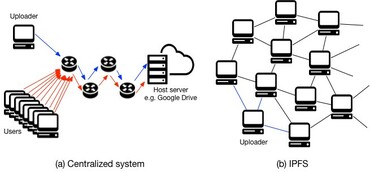The search for intelligent life
 The mythology goes like this. In the beginning, the Internet was decentralized. Then came money and Web 2.0, and they warped the best dreams of Web 2.0 into corporate giants. Now, web3 is going to restore the status ante?
The mythology goes like this. In the beginning, the Internet was decentralized. Then came money and Web 2.0, and they warped the best dreams of Web 2.0 into corporate giants. Now, web3 is going to restore the status ante?
Initial reaction: why will it be different this time?
Maybe it won't. Does that mean people shouldn't try? Ah. No. No, it does not.
One reason it's so difficult to write about web3 is that under scrutiny it dissolves into a jumble of decentralized web, cryptocurrencies, blockchain, and NFTs, though the Economist has an excellent explanatory podcast. Decentralizing the web I get: ever since Edward Snowden decentralization has been seen as a way to raise the costs of passive surveillance. The question has been: how? Blockchain and bitcoin sound nothing like the web - or a useful answer.
But even if you drop all the crypto stuff and just say "decentralized web to counter surveillance and censorship, it conveys little to the man on the Clapham omnibus. Try to explain, and you rapidly end up in a soup of acronyms that are meaningful only to technologists. In November, on first encountering web3, I suggested there are five hard problems. The first of those, ease of use, is crucial. Most people will always flock to whatever requires least effort; the kind of people who want to build a decentralized Internet are emphatically unusual. The biggest missed financial opportunity of my lifetime will likely have been ignoring the advice to buy some bitcoin in 2009 because it was just too much trouble. Most of today's big Internet companies got that way because whatever they were offering was better - more convenient, saved time, provided better results.
This week, David Rosenthal, developer of core Nvidia technologies, published a widely-discussed dissection of cryptocurrencies and blockchain, which Cory Doctorow followed quickly with a recap/critique. Tl;dr: web3 is already centralized, and blockchain and cryptocurrencies only pay off if their owners can ignore the external costs they impose on the rest of the world. Rosenthal argues that ignoring externalities is inherent in theSilicon Valley-type libertarianism from which they sprang.
Rosenthal also makes an appearance in the Economist podcast to explain that if you ask most people what the problems are with the current state of the Web, they don't talk centralization. They talk about overwhelming amounts of advertising, harassment, scams, ransomware, and expensive bandwidth. In his view, changing the technical infrastructure won't change the underlying economics - scale and network effects - that drive centralization, which, as all of these commentators note, has been the eventual result of every Internet phase since the beginning.
It's especially easy to be suspicious about this because of the venture capital money flooding in seeking returns.
"Get ready for the crash," Tim O'Reilly told CBS News. In a blog posting last December, he suggestshow to find the good stuff in web3: look for the parts that aren't about cashing out and getting rich fast but *are* about solving hard problems that matter in the real world.
This is all helpful in understanding the broader picture, but doesn't answer the question of whether there's presently meat inside web3. Once bitten, twice shy, three times don't be ridiculous.
What gave me pause was discovering that Danny O'Brien has gone to work for the Filecoin Foundation and the Filecoin Foundation for the Distributed Web - aka, "doing something in web3". O'Brien has a 30-year history of finding the interesting places to be. In the UK, he was one-half of the 1990s must-read newsletter NTK, whose slogan was "They stole our revolution. Now we're stealing it back." Filecoin - a project to develop blockchain-based distributed storage, which he describes as "the next generation of something like Bittorrent" - appears to be the next stage of that project. The mention of Bittorrent reminded how technologically dull the last few years have been.
O'Brien's explanation of Filecoin and distributed storage repeatedly evoked prior underused art that only old-timers remember. For example, in 1997 Cambridge security engineer Ross Anderson proposed the Eternity Service, an idea for distributing copies of data around the world so its removal from the Internet would be extremely difficult. There was Ian Clarke's 1999 effort to build such a thing, Freenet, a peer-to-peer platform for distributing data that briefly caused a major moral panic in the UK. Freenet failed to gain much adoption - although it's still alive today - because no one wanted to risk hosting unknown caches of data. Filecoin intends to add financial economic incentives: think a distributed cloud service.
O'Brien's mention of the need to ensure that content remains addressable evokes Ted Nelson's Project Xanadu, a pre-web set of ideas about sharing information. Finally, zero-knowledge proofs make it possible to show a proof that you have run a particular program and gotten back a specific result without revealing the input. The mathematics involved is arcane, but the consequence is far-reaching: you can prove results *and* protect privacy.
If this marriage of old and new research is "web3", suddenly it sounds much more like something that matters. And it's being built, at least partly, by people who remember the lessons of the past well enough not to repeat them. So: cautious signs that some part of "web3" will do something.
Illustrations: Diagram of centralized vs decentralized (IPFS) systems (from zK Capital at Medium).
Wendy M. Grossman is the 2013 winner of the Enigma Award. Her Web site has an extensive archive of her books, articles, and music, and an archive of earlier columns in this series. Stories about the border wars between cyberspace and real life are posted occasionally during the week at the net.wars Pinboard - or follow on Twitter.